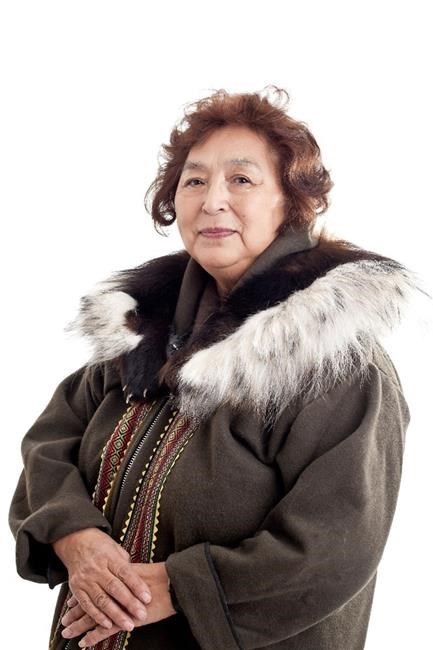
Inuvialuk knowledge keeper Margaret Olemaun Pokiak-Fenton, seen in an undated handout photo knew the power children's books have to shape your life story. The 84-year-old died in her apartment in Fort St. John, B.C., on April 21 after suffering from lung disease and diabetes. THE CANADIAN PRESS/HO-Allison Peck, *MANDATORY CREDIT*
June 04, 2021 - 2:01 PM
Inuvialuk knowledge keeper Margaret Olemaun Pokiak-Fenton knew that children's books have the power to shape your life story.
Her desire to read a children's classic sent her on the path to residential school. More than six decades later, sharing that story with young readers in "Fatty Legs" helped Pokiak-Fenton heal from the trauma of her time there, says a relative and collaborator.
The 84-year-old died in her apartment in Fort St. John, B.C., on April 21 after suffering from lung disease and diabetes. She will be laid to rest in Fairview, Alta., this month.
"Fatty Legs" co-author Christy Jordan-Fenton says Pokiak-Fenton's first-hand account of resisting mistreatment in residential school is as relevant as ever as parents look for age-appropriate ways to teach their children about the harms of the government-run system.
"She was always really moved that children who were still going through hard times could use her story to realize that there was going to be a next chapter," says Jordan-Fenton, who is the mother of three of Pokiak-Fenton's grandchildren.
"They were going to eventually see themselves as their own heroes."
Pokiak-Fenton was born on June 7, 1936, on Baillie Island off the north coast of Cape Bathurst in the Northwest Territories. She spent her early years traversing the High Arctic with her family, going on hunting trips by dogsled and sailing the ocean for supplies in a schooner.
Then, during a break from residential school, Pokiak-Fenton's half-sister shared excerpts from "Alice's Adventures in Wonderland." Eight-year-old Pokiak-Fenton begged her father to let her go to the "outsiders' school" too, so she could learn how to read the rest of the story.
After two years at the Catholic institution in Aklavik, a hamlet in the Inuvik Region, Pokiak-Fenton returned to a home that no longer felt familiar. She struggled to speak her native language, couldn't stomach the foods she was raised on, and eventually, dropped her traditional name, Olemaun, in favour of Margaret.
In her early 20s, she met her husband-to-be, Lyle Fenton, and followed him to Fort St. John, B.C., where they raised several children.
As her children grew up, got married and gave her grandchildren, Pokiak-Fenton tried to leave the trauma of residential school in the past, says Jordan-Fenton.
Jordan-Fenton says she wanted her children to take pride in their Inuvialuit heritage, and begged their grandmother to open up about her upbringing, but Pokiak-Fenton was tight-lipped.
One day while driving around town, Pokiak-Fenton told Jordan-Fenton a decades-old secret. In residential school, a nun made her wear red stockings that prompted the other schoolchildren to call her "fatty legs," but Pokiak-Fenton devised a way to dispose of the humiliating garb.
"Margaret's story was the first story where I'd heard a big amount of detail about (residential school)," says Jordan-Fenton. "It was also the first story I'd ever heard where the child got to save themselves."
She pleaded with Pokiak-Fenton to let her turn the story into a book, but was met with resistance. "She didn't want her grandchildren to know she was naughty at one time," says Jordan-Fenton.
She says Pokiak-Fenton eventually relented, figuring there wouldn't be much interest.
Published by Annick Press in 2010, "Fatty Legs" proved to be popular, spawning several followup titles and a musical tribute. The co-authors travelled the country to speak with schoolchildren.
Annick Press says the book, its sequel "A Stranger At Home," and young reader editions "When I Was Eight" and "Not My Girl," have sold more than 250,000 copies.
Jordan-Fenton says sharing her story allowed Pokiak-Fenton come to grips with her buried past and reconnect with her heritage, including the name she was born with, Olemaun.
"She reclaimed that girl who was very resilient and very clever and very stubborn in a really good way," says Jordan-Fenton, adding that Pokiak-Fenton got a traditional tattoo of a caribou at age 81.
Jordan-Fenton says her inbox has been flooded with inquiries about "Fatty Legs" since last week's discovery of what are believed to be the unmarked graves of 215 children at a former residential school in Kamloops, B.C.
While children shouldn't be shielded from the dark chapters of Canada's history, Jordan-Fenton urges parents to honour Pokiak-Fenton's desire to have these truths told in a manner that young people can process.
"She didn't want children to be having nightmares. She didn't want them to be further victimized," says Jordan-Fenton. "She felt like that would be a ripple-out effect of the trauma she went through and then that other children would be carrying that."
The discovery in Kamloops has spurred mounting calls for the federal government and Catholic Church to investigate more potential school burial sites as part of a national reckoning over the legacy of Canada's residential school system.
But it's vital that these horrors not overshadow stories about residential school survivors' strength and resilience, Jordan-Fenton says.
She says "Fatty Legs" continues to resonate because it portrays its protagonist not as a victim, but a hero in her own story. Pokiak-Fenton wanted the next generation of Indigenous children to see themselves the same way, she says.
"Indigenous children with a traditional upbringing really did save themselves," says Jordan-Fenton. "They were very clever, very strong (and) had to be very quick-witted to make it through the schools."
This report by The Canadian Press was first published June 4, 2021.
News from © The Canadian Press, 2021